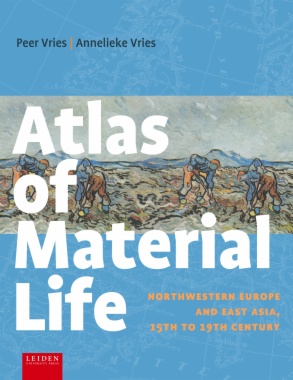Large-scale comparative economic history of westernmost and easternmost Eurasia can be beneficial for the understanding of global history. This book provides a description of material life in North-western Europe and East Asia, for the period from the late fifteenth to the late nineteenth centuries, with a focus on developments in Great Britain and the Dutch Republic on the one hand and China and Japan on the other hand. With maps, tables, graphs and figures as a prominent and integral part of the book, it provides information, in an accessible format, on the main characteristics of the economic landscape of this period. It demonstrates the constraints to which all pre-industrial economies were subjected because of their dependence on organic natural resources but also the different ways in which the societies discussed dealt with those constraints. To provide a better understanding of this economy of limited possibilities, the final chapter of the book is devoted to the emergence of modern economic growth in Western Europe.
- FRONTCOVER
- TABLE OF CONTENTS
- A BRIEF INTRODUCTION
- GEOGRAPHY AND DEMOGRAPHY
- Sizes
- Physical geography
- Weather and climate
- The tyranny of distance
- The variability and unpredictability of life in the pre-industrial world
- Population and population density
- Life expectancy, health and disease
- Violence
- ENERGY
- Human labour power
- The labour power of animals
- Firewood
- Peat
- Coal
- Gunpowder
- Watermills
- Windmills
- Water and wind and their role in transport
- RESOURCES
- Land
- Animals
- Animal manure and night soil
- Wood
- Metals: iron and bullion
- Frontiers and ghost acreages
- AGRICULTURE
- The agricultural labour force, the share of agriculture in GDP and urbanisation
- The importance of food in budgets
- Agricultural productivity
- Agricultural systems: China’s rice economy
- Agricultural systems: Great Britain’s wheat economy
- What about Japan?
- EXCHANGES
- Migration
- Intercontinental migration
- Slave trades and the importance of other forms of ‘coerced migration’.
- The demographic impact of European overseas migration
- Chinese and Japanese overseas emigrations
- The Columbian Exchange: flora, fauna and diseases
- Flows and stocks of bullion
- Monetary systems
- Technologies and relative scarcities
- Intercontinental commodity trade
- A modern world-system?
- A sinocentric alternative to Eurocentrism?
- Intercontinental trade as an almost entirely European affair
- STAGNATION AND GROWTH
- The tension between population and resources
- Positive checks
- Preventive checks: The (Western) European marriage pattern and East Asian alternatives
- Sustainability in Tokugawa Japan
- A world without growth?
- Malthusian constraints?
- Efflorescences
- Modern economic growth before the Industrial Revolution? The case of Song China, 976-1279 as compared to developments under the Ming and Qing
- Modern economic growth before the Industrial Revolution? The case of the Dutch Republic during its Golden Age
- Sprouts of pre-modern growth?
- GDP, wages and incomes
- Inequality, poverty and famine
- Consumption
- SOURCES OF GROWTH? CHANGES IN PRODUCTION AND TRANSPORT
- Increased production and productivity in agriculture
- Industrious revolutions
- Increased investment and (micro-)innovations
- Improved human capital
- A better measure of reality
- Improved transport
- Transport over land
- Transport over water
- Shipping on the open seas
- SOURCES OF GROWTH? MARKETS AND STATES
- Specialisation and market extension
- Global market integration
- A rise of capitalism?
- A decline of the commons?
- A decline of the guilds?
- A rise of free labour?
- Capitalists, capitalism and the state
- State formation, state capacity and empire
- State formation and state capacity
- Military strength
- Empire building versus imperial disintegration
- THE GREAT DIVERGENCE
- The emergence of a new economic regime
- New energy and new technology
- Railways and steam shipping
- The wider impact of the new economic regime
- Great Divergence and fossil-fuel ghost acreage
- Exchanges
- Migration during the Great Divergence
- Great Divergence, import ghost acreage and Great Specialisation
- Different trajectories, change and continuity
- Investment and Great Divergence
- The case of Great Britain
- Did the Dutch Republic, Qing China or Tokugawa Japan have sufficient financial resources to industrialise?
- REVIEW AND REFLECTION
- BIBLIOGRAPHY
- BACKCOVER

